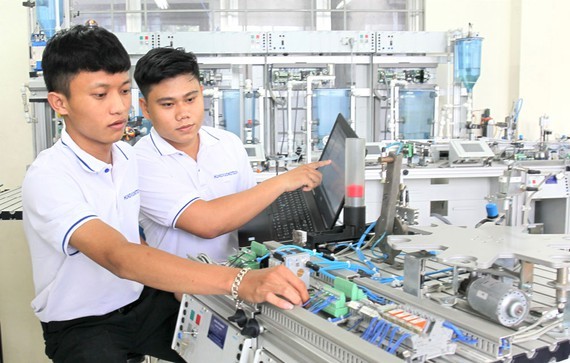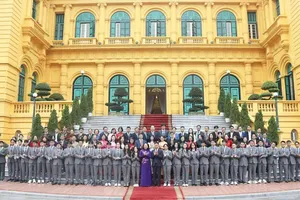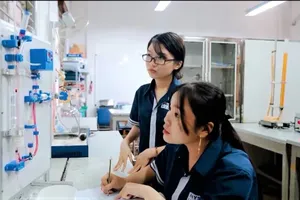
The dual vocational training program has helped to improve the quality of human resources and to narrow the gap between training and work experience in Ho Chi Minh City.
Cao Van Minh, the former student at Hung Vuong vocational school, said that after he dropped out of HCMC University of Transport and Communications, he enrolled in the vocational school because he felt uninterested in training program in the university in spite of family and social prejudices.
His decision was correct as he earned a gold medal in the tenth national skills competition in 2018 with the field of Computer Numerical Control Machine Operator.
Minh shared that he got a decent job with a handsome salary of nearly VND20 million (US$861.8) per month at DENSO Vietnam company after graduation; therefore, his delighted parents have changed their wrong opinions about vocational training.
Moreover, when the school has started the dual training program, Minh has taken a role a bridge to help his junior peers in the school in the internship period. This program includes 30 percent of theoretical courses and 70 percent of practical courses in the business.
According to school principal, Pham Quang Trang Thuy, the school has linked with about 500 businesses to support their students’ tuition fees and offer job opportunities.
Meantime, Thu Duc College of Technology yearly admits over 3,000 students. Furthermore, around 7,000 students who pursue elementary and regular vocational training program I the school. The school currently has training 7 key majors listed in the top industries.
In particular, the school has exchange programs linked with their partners in Germany and Japan; therefore, students have the opportunity to receive dual Vietnamese and German degrees and work in the branches of Freesia Group in Vietnam, Japan, and Germany after graduation.
Around 20 percent of students have part-time jobs while over 80 percent of graduates have been employed, said Mr. Pham Quang Tuan, Vice-principal of the school.
Ho Chi Minh City has four key industries and needs a large number of workers in the field of Mechanical; Electronics - Information technology; Processing refined food - food; Chemical - plastic - Rubber.
To provide a number of qualified workers with international abilities in the four key industries, the schools has developed training strategies. Post-graduates will have stable jobs with starting salaries from VND7 million to VND10 million per month, Pham Quang Tuan said.
According to Le Minh Tan, Directors of the Department of Labors, War Invalids, and Social Affairs of Ho Chi Minh City, the rate of trained workers is 85.2 percent while that of key industry and service industry reaches 87 percent.
So far, Ho Chi Minh City has built 14 high-quality schools associating with the city’s key fields. These days, the dual training program have gradually innovated and enhanced with up-to-the-minute programs resulting high rate of graduates with above 85 percent.
In order to narrow the gap between training and demand of the labor market, Ho Chi Minh City orients towards opening more training programs with focus on hands-on experience and work skills including group work and team work.
The education sector in the city has also cultivated students’ startup ideas and paid attention to teaching foreign language to help students to work in multi-national companies.
In five recent years, around 671,200 new jobs have been created offering more than 312,600 employment, an average increase of 8.4 percent compared to the last tenure 2010-2015. City authorities have organized online and offline employment fair especially in outlying districts to offer jobs to rural employees.
























